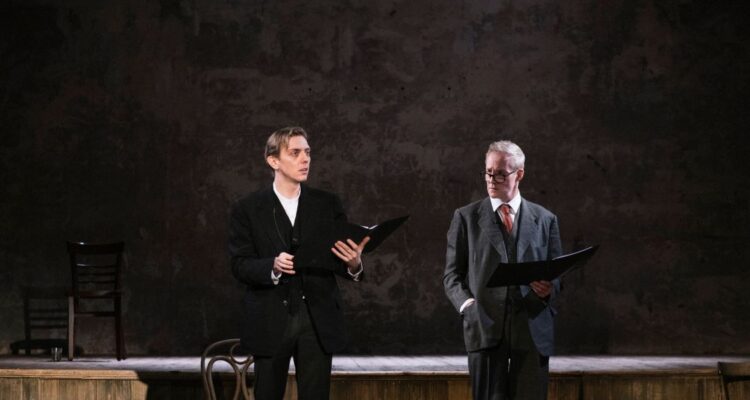‘Dead Poets Live’ offers an occasional series of retrospectives on the work of distinguished poets where the focus is very much on the reading of the poetry itself, both familiar and unfamiliar. But this is far more than a poetry reading or recital. A dramatic framework is constructed around the poetry itself which allows the audience to experience the intertextual relationships between life and writings. As a result the poetry emerges from the texture naturally just as in a musical a song emerges naturally from that point in the dialogue where ordinary words are no longer sufficient or adequate to the emotion and moment.
Gerard Manley Hopkins is the latest candidate for this treatment at Wilton’s Music Hall. His work is a most apt choice on a number of levels. While it hard to imagine this austere Jesuit ever attending a music hall, the shabby chic interior of Wilton’s adds the right Victorian patina to the occasion; and the absence of backdrop or scenery – just a chair or two – leaves the focus unambiguously on the spoken word. Moreover, the intensely charged imagery and virtuosic intensity represented by his technique of ‘sprung rhythm’ virtually requires oral delivery for its full remarkable effects and originality to be felt.
Oliver Rowse and James Lever have assembled a fine selection of his work, blending the familiar with the unfamiliar, and representing the full range of his poetic palette. These works are framed in a most revealing way with a dialogue between Hopkins and Robert Bridges, his university contemporary at Oxford and later his closest friend. Bridges, though a much lesser poet, became an establishment figure and ultimately Poet Laureate. He was also responsible for the first edition of Hopkins’ poetry though long after the latter’s death, and something of a double-edged homage. This device allows us, with the help of Bridges, to share his wonder and bemusement at the apparent perverse difficulty of Hopkins’ poetry through the medium of the eloquent correspondence between the two. We also discern, though lightly and deftly sketched in, the main lineaments of Hopkins’ short and mainly unhappy life.
This framework opens up a window into Hopkins’ unique blend of technical virtuosity, spiritual austerity and hyper-sensuous physicality that helps make sense of the whole, while also allowing us to listen in on a fascinating debate between two poets on the nature and possibilities of their craft.
However, none of this would come across without the skills of the performers and both Joshua James and Peter McDonald perform miracles of varied inflection, shading and emphasis in their portrayals of the characters and delivery of the verse. James, who bears a remarkable likeness to Hopkins, captures the many paradoxes of Hopkins in a compelling way – the combination of frailty and fierceness, unworldliness and relish in natural beauty; and McDonald conveys the admiration and perplexity and frustration of a lesser talent both astonished by and jealous of the genius of his troubled and wayward friend.
There is a delightful twist towards the end where we get to appreciate the influence and legacy of the poet in a way that is made fully dramatically persuasive. McDonald appears again as the poet Seamus Heaney and offers an appreciation, based on a real interview with Heaney, of how much so many modern poets owe to Hopkins. This provides an elegant coda to a finely crafted evening.
There seems to me to be one omission and that is the absence of any reference to Hopkins sexuality where much more is now known and discussed than used to be the case. This was a missed opportunity. There are poems, such as ‘Epithalamion’ which reveal a great deal, and its inclusion would have offered another dramatic means of tapping into the sources of the poet’s creativity and made sense of the continuous impression you have of sensuality seeking an outlet rather than yet another sublimation. Finally, it would underscore and deepen the sadness you feel at the poet’s later-life despair atop ‘cliffs of fall frightful.’
Script & Direction: Oliver Rowse & James Lever
Venue: Wilton’s Music Hall
Cast: Joshua James and Peter McDonald
Until: 7th March 2024
2 hrs with interval

